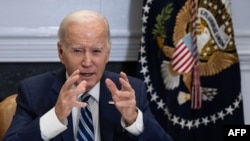U.S. President Joe Biden highlighted "strong international coordination" by his administration to halt the flow of fentanyl and the ingredients used to produce the deadly drug following his diplomatic engagements with leaders of China and Mexico last week.
"We've focused on prevention, harm reduction, treatment and recovery," he said on Tuesday during a meeting at the White House to address the scourge of the illicit drug that has killed more than 200,000 Americans in recent years. "But this challenge also has roots outside our borders, outside the borders of the United States."
Biden vowed to accelerate his administration's efforts to combat the drug following counternarcotics deals with Beijing and Mexico City reached last week on the sidelines of the Asia-Pacific Economic Cooperation summit in San Francisco.
Fentanyl is mass-produced in Mexico using precursor chemicals largely from China and trafficked via cartels into the U.S.
"It's a global challenge that demands global action," Biden said.
Following their meeting, Biden and Chinese President Xi Jinping announced the resumption of bilateral cooperation on counternarcotics to reduce the flow of precursor chemicals that fuel fentanyl.
"It's a big step forward, and we're grateful for that," said John Kirby, National Security Council coordinator for strategic communications, during a briefing for reporters on Tuesday. "It may be some time before you see the practical results."
With Mexican President Andrés Manuel López Obrador, Biden agreed to expand law enforcement cooperation and intelligence sharing to restrict trafficking of the drug.
The administration has been under pressure to take tougher measures to stop fentanyl from coming into the country. Republican lawmakers regularly highlight the smuggling of fentanyl as a reason to fortify the U.S.-Mexico border. Several Republican candidates say they would use military force against Mexican cartels in response to the trafficking of fentanyl and other synthetic opioids.
Republicans also accuse Biden of being soft on China's role in the epidemic.
"Communist China's actions have told us that they choose to be our enemy. Fentanyl produced in China has killed thousands of Americans," Republican Senator Rick Scott said in a statement.
Ineffective track record
China can control the flow of precursor chemicals in ways that Latin American governments cannot, but whether Beijing will invest in the effort remains to be seen, said Peter Reuter, professor in the School of Public Policy and the Department of Criminology at the University of Maryland.
Past efforts to control production and exports from outside the country have proved ineffective, he said.
"We always worry about displacement," Reuter told VOA. "That is that if China stops sending the precursors, that the very large, poorly regulated, corruptly regulated, Indian industry will replace China."
Illegal fentanyl is often produced in clandestine laboratories using precursors and fentanyl analogs produced by legitimate chemical and pharmaceutical companies that are not domestically or internationally regulated.
A heavy focus on supply-based strategies to limit their entry from abroad can be counterproductive to the positive steps in harm reduction that the administration has taken as traffickers find workarounds to avoid breaking the law, said Brandon Marshall, professor of epidemiology at the Brown University School of Public Health.
"Many of these efforts to restrict the supply lead traffickers to identify substances which are more potent," he told VOA. "That's what we see play over and over again."
Biden urged lawmakers to approve more funds to support Americans with substance abuse disorders and close existing loopholes for small shipments of the drug, which can go undetected in border crossings and even through the postal system.
"I also urge Congress to permanently make fentanyl and related substances as Schedule One drugs," he said.
Such a move means that drug users would be even more stigmatized and move them further away from the help that they need, said Mary Sylla, director of Overdose Prevention Policy and Strategy at the National Harm Reduction Coalition, an advocacy group for the rights of people who use drugs.
That puts people into a prison system that actually increases the likelihood of overdose, she told VOA.
Sylla argued that more focus and resources should be placed instead on efforts to reduce the negative impacts of substance use, including syringe services, overdose prevention and drug treatment for those who are interested.
In 2018, the Trump administration placed a temporary class-wide emergency scheduling of fentanyl-related substances, chemicals that are similar in structure to fentanyl as used in clinical/hospital settings. The emergency ban has been extended by Congress several times.
The ban may have unintended and negative impacts, including making research on these substances much more difficult, Marshall said.
In 2021, a group of more than 100 organizations wrote a letter urging Congress and the Biden administration to allow the emergency scheduling to expire, arguing that the scheduling exacerbates pretrial detention, mass incarceration and racial disparities in the prison system.
"As we approach the 50-year milestone of President Nixon's announcement of the War on Drugs, there is ample evidence that these unscientific policies destroy communities, entrench racial disparities, and do nothing to reduce drug supply or demand," the letter said.
Katherine Gypson contributed to this report.










